6步写好法律英语(A legal brief )
根据法律作文英语模板
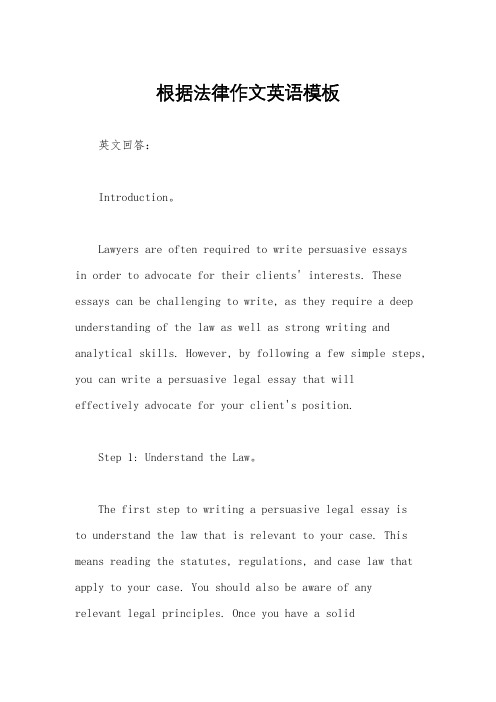
根据法律作文英语模板英文回答:Introduction。
Lawyers are often required to write persuasive essaysin order to advocate for their clients' interests. These essays can be challenging to write, as they require a deep understanding of the law as well as strong writing and analytical skills. However, by following a few simple steps, you can write a persuasive legal essay that willeffectively advocate for your client's position.Step 1: Understand the Law。
The first step to writing a persuasive legal essay isto understand the law that is relevant to your case. This means reading the statutes, regulations, and case law that apply to your case. You should also be aware of anyrelevant legal principles. Once you have a solidunderstanding of the law, you can begin to develop your arguments.Step 2: Develop Your Arguments。
Once you understand the law, you can begin to develop your arguments. Your arguments should be based on the facts of your case and the law that applies to your case. You should also consider the arguments that the other side is likely to make. When developing your arguments, it is important to be persuasive. This means using strong evidence to support your claims and avoiding logical fallacies.Step 3: Write Your Essay。
法律英语经典作文模板
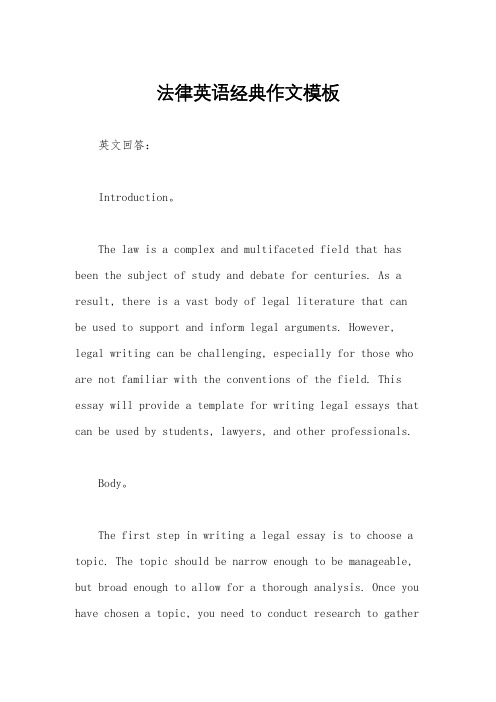
法律英语经典作文模板英文回答:Introduction。
The law is a complex and multifaceted field that has been the subject of study and debate for centuries. As a result, there is a vast body of legal literature that can be used to support and inform legal arguments. However, legal writing can be challenging, especially for those who are not familiar with the conventions of the field. This essay will provide a template for writing legal essays that can be used by students, lawyers, and other professionals.Body。
The first step in writing a legal essay is to choose a topic. The topic should be narrow enough to be manageable, but broad enough to allow for a thorough analysis. Once you have chosen a topic, you need to conduct research to gatherinformation and support for your argument. This research can be done using a variety of sources, including legal databases, law books, and journal articles.Once you have gathered your research, you need to organize it into an outline. The outline will help you to structure your essay and ensure that it flows logically. The outline should include an introduction, a body, and a conclusion.The introduction should provide a brief overview of your topic and your argument. The body should be divided into paragraphs that each discuss a different aspect of your argument. The paragraphs should be well-organized and should use evidence from your research to support your claims.The conclusion should summarize your argument and restate your thesis statement. The conclusion should also provide a brief 展望 for future research or discussion.Conclusion。
如何学好法律英语(一)(共5篇)

如何学好法律英语(一)(共5篇)第一篇:如何学好法律英语(一)免费?宅在家学英语?怎么报名?最牛英语口语培训模式:躺在家里练口语,全程外教一对一,三个月畅谈无阻!如何学好法律英语(一)今天我们洛基新开通了一个《法律英语》的专栏,旨在向大家介绍一些基础的法律英语知识,包括如何学好、常用词汇、经典对话、法律文本等等,希望大家喜欢。
第一篇就向大家介绍如何学好法律英语这个大问题,这只是一个网友的意见,大家可以酌情看之,量身定制自己的法律英语学习计划。
1、关于法律文件的翻译:学习法律英语,碰到最多的就是翻译法律文件了,这里的文件一般包括法律、规章、条例、条约、协定、合同、章程、保证书、判决书等等。
在联合国范围内则有国际法院的判决和咨询意见,大会和安全理事会的决议,联合国国际法委员会草拟的条款草案和其他文件等。
法律英语翻译自然不同于一般的中英互译。
从专业方面说,翻译法律文件要有法律专业的知识,否则难以正确理解原文,也不会正确地表达出来。
翻译英文法律文件困难更多。
因为世界上有两个主要的法律体系,一个是英美法系或普通法法系,另一个是大陆法系或民法法系。
我国在旧中国时代属于大陆法系,在新中国时代则不属其中任何一个法系,自成一个独立的法系,但比较接近于大陆法系。
英文法律文件大多属于英美法系,其中的用语、概念与我国的用语、概念差异甚多,甚至是较大的差异,有的概念、制度在中国并不存在,所以要译成中文就碰到难题,没有适当的译法。
洛基英语是中国英语培训市场上的一朵奇葩,是全球已被验证的东方人英语学习的最佳模式。
洛基英语是中国专业在线英语培训机构,通过电话英语、视频英语与外教一对一的模式提高学员英语口语水平,提供英语口语培训,成人英语培训,商务英语培训,企业英语培训等课程。
免费?宅在家学英语?怎么报名?例如英国律师有两类:barristert和solicitor,而中国只有一类,如何译?香港将barrister译为“大律师”,而将solicitor译为“律师”,这样译明显地将二者定出高低等级,是不可取的。
如何学好法律技巧英语作文

如何学好法律技巧英语作文英文:To learn good legal English writing skills, I believeit's important to first have a strong foundation in both English and legal knowledge. This means having a good grasp of grammar, vocabulary, and sentence structure in English, as well as understanding the key legal concepts and terminology. 。
One way to improve legal English writing skills is to read a lot of legal texts in English, such as court judgments, legal articles, and case studies. This will help you become familiar with the language used in the legal field and how legal arguments are structured and presented. 。
Another important aspect is to practice writing legal documents and essays in English. This could involve writing case briefs, legal memos, or even legal opinion letters. Bydoing so, you can learn how to effectively convey legal arguments and analysis in English, and also improve your ability to use legal terminology accurately.Furthermore, seeking feedback from legal English teachers or professionals can be very helpful. They can provide valuable insights and guidance on how to improve your legal English writing skills, and point out any errors or areas for improvement.In addition, it's important to be aware of the differences between legal English and general English.Legal English often involves the use of formal language, complex sentence structures, and specific legal terminology. Therefore, it's important to pay attention to these differences and practice using them in your writing.Finally, I believe that immersing oneself in the legal English environment can also be beneficial. This could involve participating in legal English workshops, attending legal English courses, or even engaging in legaldiscussions with peers in English.中文:要学好法律技巧英语作文,我认为首先要有扎实的英语和法律知识基础。
介绍法律英文作文
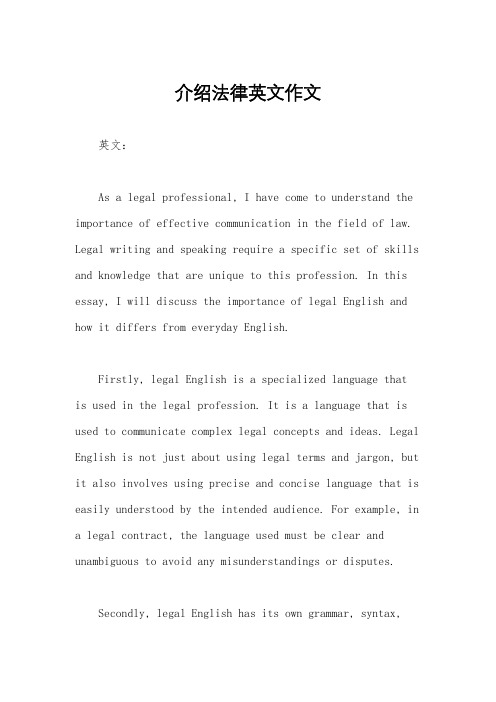
介绍法律英文作文英文:As a legal professional, I have come to understand the importance of effective communication in the field of law. Legal writing and speaking require a specific set of skills and knowledge that are unique to this profession. In this essay, I will discuss the importance of legal English and how it differs from everyday English.Firstly, legal English is a specialized language that is used in the legal profession. It is a language that is used to communicate complex legal concepts and ideas. Legal English is not just about using legal terms and jargon, but it also involves using precise and concise language that is easily understood by the intended audience. For example, in a legal contract, the language used must be clear and unambiguous to avoid any misunderstandings or disputes.Secondly, legal English has its own grammar, syntax,and vocabulary. Legal writing often involves the use of passive voice, which is not commonly used in everyday English. In addition, legal English has a unique vocabulary that includes legal terms, Latin phrases, and technical jargon. For instance, terms like "tort," "breach of contract," and "negligence" are commonly used in legal English but may not be familiar to the average person.Lastly, legal English requires a certain level of formality and precision. In legal writing, it is important to use formal language and avoid colloquialisms or slang. This is because legal documents are often used in court and need to be taken seriously. For example, in a legal brief, it is important to use precise language and avoid exaggeration or emotional language.中文:作为一名法律专业人士,我深刻理解在法律领域中有效沟通的重要性。
如何学好法律英语

如何学好法律英语Legal English is a specialized area of English that is used in the legal profession, particularly in legal documents, courtrooms, and law firms. It is important to have a good understanding of legal English if you are a law student, legal professional, or anyone who deals with legal matters.Learning legal English can be challenging, but with the right approach and dedication, you can improve your language skills in this area. Here are some tips on how to learn legal English effectively:1. Understand the BasicsBefore diving into the complexities of legal English, it is important to have a good grasp of the basics. This includes understanding the structure of legal documents, the vocabulary commonly used in legal texts, and the different types of legal terminology. Take the time to familiarize yourself with the basic concepts of legal English so that you can build a solid foundation for your learning.2. Study Legal TerminologyLegal English is filled with specialized terminology that is unique to the legal profession. To improve your understanding of legal English, it is essential to study and memorize the key legal terms and phrases that are commonly used in legal documents and courtrooms. You can use online resources, legal dictionaries, and textbooks to help you learn and remember the legal terminology.3. Read Legal DocumentsOne of the best ways to improve your legal English skills is to read legal documents regularly. This can include court cases, legal briefs, contracts, and other legal texts. Reading legal documents will help you become familiar with the language, structure, and style of legal writing. Pay attention to how legal arguments are presented, the use of legal terminology, and the overall structure of the document.4. Take Legal English CoursesIf you are serious about learning legal English, consider enrolling in a legal English course. There are many online courses and programs available that are specifically designed to help students improve their legal English skills. These courses typically cover topics such as legal vocabulary, legal writing, and communication skills in a legal context. Taking a legal English course can provide you with valuable guidance and feedback from experienced instructors.5. Practice Speaking and WritingTo become proficient in legal English, it is important to practice speaking and writing in a legal context. Try having conversations about legal topics with classmates, colleagues, orfriends who are also interested in the law. Additionally, practice writing legal documents, such as legal letters, legal memos, and briefs. This will help you become more comfortable with using legal English in a practical setting.6. Watch Legal TV Shows and MoviesWatching legal TV shows and movies can be a fun and effective way to improve your legal English skills. Pay attention to how legal professionals communicate, argue, and present their cases in court. This can help you learn more about the language and style of legal English in a real-world context. Some popular legal TV shows and movies to consider watching include "The Good Wife," "Law & Order," and "A Few Good Men."7. Join Legal English Study GroupsConsider joining a legal English study group or discussion forum where you can connect with other students and legal professionals who are also interested in improving their legal English skills. Study groups can provide you with a supportive environment to practice speaking, ask questions, and share resources. Additionally, discussing legal topics with others can help you gain different perspectives and insights on legal issues.8. Use Legal English ResourcesThere are many resources available to help you learn legal English, such as legal dictionaries, online glossaries, and legal writing guides. Take advantage of these resources to expand your knowledge of legal terminology and improve your legal writing skills. Additionally, consider using legal English textbooks and reference materials to deepen your understanding of legal concepts and principles.9. Stay Updated on Legal NewsTo stay current with legal trends and developments, make an effort to follow legal news and updates. This can include reading legal blogs, subscribing to legal newsletters, and following legal organizations on social media. By staying informed on legal news, you can expand your knowledge of legal issues and enhance your understanding of legal English in a real-world context.10. Practice RegularlyLearning legal English is a continuous process that requires regular practice and dedication. Make an effort to practice your language skills every day by reading legal texts, writing legal documents, and engaging in legal discussions. The more you practice, the more confident and proficient you will become in using legal English.In conclusion, learning legal English can be a challenging but rewarding journey. By following these tips and strategies, you can improve your legal English skills and enhance your understanding of legal terminology, writing, and communication. Remember to staypatient and persistent in your learning efforts, and you will soon become proficient in legal English.。
英文法律文书简明教程(精选3篇)
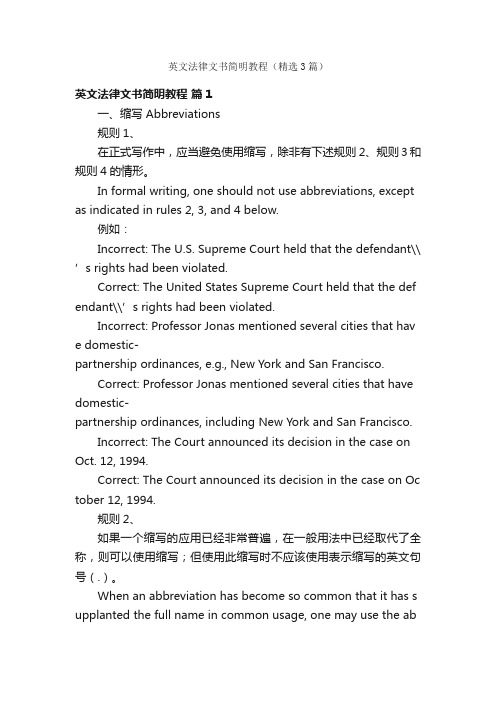
英文法律文书简明教程(精选3篇)英文法律文书简明教程篇1一、缩写 Abbreviations规则1、在正式写作中,应当避免使用缩写,除非有下述规则2、规则3和规则4的情形。
In formal writing, one should not use abbreviations, except as indicated in rules 2, 3, and 4 below.例如:Incorrect: The U.S. Supreme Court held that the defendant\\’s rights had been violated.Correct: The United States Supreme Court held that the def endant\\’s rights had been violated.Incorrect: Professor Jonas mentioned several cities that hav e domestic-partnership ordinances, e.g., New York and San Francisco.Correct: Professor Jonas mentioned several cities that have domestic-partnership ordinances, including New York and San Francisco.Incorrect: The Court announced its decision in the case on Oct. 12, 1994.Correct: The Court announced its decision in the case on Oc tober 12, 1994.规则2、如果一个缩写的应用已经非常普遍,在一般用法中已经取代了全称,则可以使用缩写;但使用此缩写时不应该使用表示缩写的英文句号(.)。
不同层次的法律英语作文
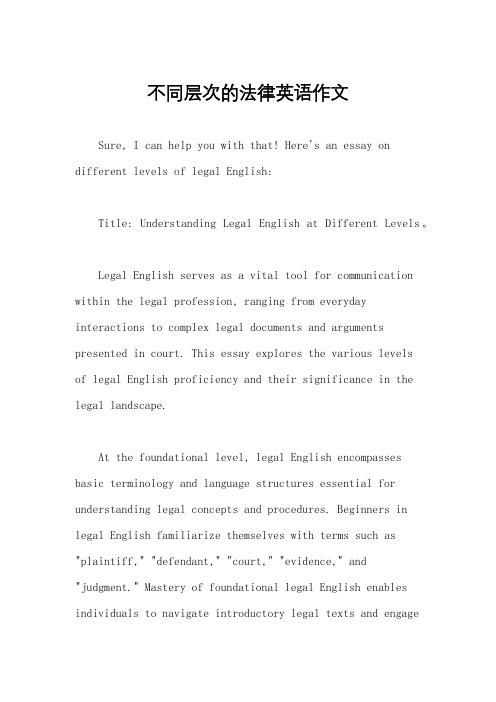
不同层次的法律英语作文Sure, I can help you with that! Here's an essay on different levels of legal English:Title: Understanding Legal English at Different Levels。
Legal English serves as a vital tool for communication within the legal profession, ranging from everyday interactions to complex legal documents and arguments presented in court. This essay explores the various levelsof legal English proficiency and their significance in the legal landscape.At the foundational level, legal English encompasses basic terminology and language structures essential for understanding legal concepts and procedures. Beginners in legal English familiarize themselves with terms such as "plaintiff," "defendant," "court," "evidence," and "judgment." Mastery of foundational legal English enables individuals to navigate introductory legal texts and engagein basic legal conversations.Moving beyond the foundational level, intermediate proficiency in legal English involves a deeper understanding of legal principles and more specialized vocabulary. Intermediate learners delve into areas such as contract law, tort law, criminal law, and constitutional law. They become adept at analyzing legal documents such as contracts, statutes, and case briefs. Intermediate proficiency empowers individuals to participate in discussions on legal issues with greater depth and clarity.At the advanced level, legal English proficiency reaches a level of sophistication necessary for professional practice and advanced academic study. Advanced learners possess an extensive legal vocabulary and are capable of comprehending complex legal texts, including court opinions and scholarly articles. They can construct persuasive legal arguments, draft legal documents, and deliver oral arguments in court with precision and fluency. Advanced proficiency in legal English is essential for success in legal careers such as litigation, corporate law,and academia.Beyond the advanced level, mastery of legal English involves nuanced understanding and effective communication in specialized legal fields. Professionals in areas such as intellectual property law, international law, and human rights law require specialized vocabulary and in-depth knowledge of legal principles specific to their field. Mastery of legal English at this level enablespractitioners to navigate intricate legal frameworks, negotiate complex agreements, and advocate for clients with expertise and authority.In conclusion, proficiency in legal English encompasses a spectrum of levels, each with its own significance and implications in the legal profession. From foundational knowledge to mastery in specialized fields, the ability to communicate effectively in legal English is essential for success in legal practice, academic study, and professional advancement. Continuous learning and development in legal English ensure that legal professionals remain competent and capable in an ever-evolving legal landscape.。
- 1、下载文档前请自行甄别文档内容的完整性,平台不提供额外的编辑、内容补充、找答案等附加服务。
- 2、"仅部分预览"的文档,不可在线预览部分如存在完整性等问题,可反馈申请退款(可完整预览的文档不适用该条件!)。
- 3、如文档侵犯您的权益,请联系客服反馈,我们会尽快为您处理(人工客服工作时间:9:00-18:30)。
A legal brief is a document used to submit an argument to a court. Briefs are generally written by lawyers and are intended to persuade the court to rule in your favor on a particular issue. Here are a few tips to help you write an effective legal brief.
Step 1
Prepare a caption. Court rules state that every pleading should contain a caption including the name of the court, the title of the action, the file number and names of the parties.
Step 2
Begin with a preliminary statement. This should identify the party submitting the brief and inform the court of the relief requested. Generally, a preliminary statement should be kept short and provide the court with enough information to understand the issues to be addressed in the brief.
Step 3
State the facts relevant to the brief. Facts should not be misrepresented, but can be presented in a way that is favorable to your argument. Be sure to cite to the record to support these facts. Step 4
Make your argument. This is the part of the brief where you present your case. Analyze why the law supports the relief you are requesting. Apply the law to your set of facts and cite to cases that support your position. Generally, you should make your strongest arguments first, followed by secondary relevant arguments.
Step 5
Acknowledge the counter-argument. It won’t help your case to ignore any valid arguments that can be made by the other side. Address these arguments and explain to the court why your case is different. Distinguish any relevant cases that do not support your argument on their facts.
Step 6
Conclude your brief. Tell the court what relief you are seeking and ask for that relief.
Tips & Warnings
1. Try to keep your brief brief. Courts appreciate brevity and clarity.
2. Avoid legalese and incivility.。
